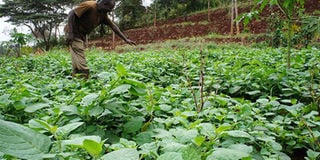Time we promoted traditional foods

A managu' (African nightshade) farm in Murang'a. It is a type of traditional food that is better than processed ones. PHOTO | FILE | NATION MEDIA GROUP
What you need to know:
- Nothing beats home-made fresh managu (African nightshade), or mrenda, with ugali or sweet potatoes with red millet gruel.
- Could the acceptance of refined foods as a mark of sophistication be the reason why places like central Kenya have abnormally high rates of lifestyle diseases, like diabetes?
The recent government warning over aflatoxin contamination of a popular peanut butter brand should remind Kenyans how far things have gone wrong in our food cultures.
We have steadily lost our cultivation, preparation and cooking cultures. Cooking has become less common in households and, with it, wholemeal diets are disappearing from the dining table.
While our ancestors thrived on natural foods, we have embraced poisons in the name of processed foods, for the ‘progressive’, which shorten our lives.
Reasons for this trend include Kenyans having become richer (not necessarily wealthier). The rich do not cook and tend to eat more processed foods.
In the past 20 years, the middle class has ballooned from less than 15 percent of the population in 2000 to 45 percent in 2018.
According to the African Development Bank, you are in the middle class in Africa if your daily individual expenditure is Sh200 to Sh1,000.
WORKING CLASS
This busy bee has no time to pass by Githurai or Marigiti green markets for fresh food to cook at home. The trend notably afflicts the 30-40 age blanket, the married included. This class eats out.
After a day’s work, these workhorses are in no cooking mood — a boring chore among the youth, rich or poor.
If they don’t eat in some high-end or mid-budget restaurants, they buy hot, ready-to-eat meals in supermarkets.
Now any supermarket worth the name has a kitchen and, sometimes, restaurant. And the queues only get longer.
They eat in the vehicle or warm it in the microwave or some sous vide gadget at home. Then the workaholic is soon back on the laptop.
Then is the emerging gourmet class — a hippie lot that enjoys fine food and drink accompanied by their hairy friends, 'Chihuahua'.
NUTRITIOUS
The food prepared in these (high-end) restaurants is not necessarily bad nutrition-wise.
However, nothing beats home-made fresh managu (African nightshade), or mrenda, with ugali or sweet potatoes with red millet gruel. The aroma of terere (amaranth) or stinging nettle is therapeutic.
In addition, buying and cooking your own food puts nutrient preservation under your control. All you need are some basic hygiene and nutrient-preserving skills in cooking and you put clinicians out of work!
Interestingly, the ancient Doctrine of Signatures (aka homeopathy) has it that a particular food heals the part of the body resembling it.
Apparently, the gods of food got tired explaining the health benefits of foods to recalcitrant humans and just versioned foods according to the motto attributed to Hippocrates, the ‘Father of Medicine’, “Like cures like”!
MINERALS
Accordingly, such phallic foods like bananas and courgette (zucchini) are thought to be aphrodisiac! This is not some grandmother’s tale, really.
Nature has packed these foods with magnesium, potassium and other ingredients scientifically known to lower blood pressure, which is good for male sexual problems.
Now, biotechnology may have distorted all that. Processing food removes all these benefits.
And although the colonial agricultural policy branded our foods as “weeds” to give way to exotics such as cabbage and sukuma wiki (kale), Kenya is ahead of many other African countries in its economic bracket regarding traditional foods.
We may have abandoned the village, but we love traditional foods. The Kenyan mama mboga epitomises a traditional food culture and economy rare in Africa.
DISEASES
Asking for mboga (vegetable accompaniment) in a Tanzanian restaurant is a sure giveaway that you are Kenyan. Mboga, to our good neighbours to the south, means beef, chicken or pork soup (aka ‘kiti moto’).
In South Africa, traditional food is associated with poverty and rural drudgery. The ‘Rainbow Nation’ middle class (much richer than ours) wouldn’t be seen dead eating sweet potatoes.
This assimilation of foreign foods has had a devastating effect on health. Could the acceptance of refined foods as a mark of sophistication be the reason why places like central Kenya have abnormally high rates of lifestyle diseases, like diabetes?
There is also the harm on the ecosystem.
FARMING
Exotic foods negatively affect environment. They need a lot of resources to grow, including harmful chemicals, while traditional food only needs manure and some rain.
In her inaugural lecture on African indigenous vegetables (available online), Prof Abukutsa Onyango extols the health, economic and environmental benefits of traditional foods.
She recommends promotion of indigenous food through ‘strategic repositioning’ that includes policy, advocacy and teaching in schools and universities.
Can the government forge a Traditional Food Policy?
Dr Mbataru teaches public policy at Kenyatta University. [email protected]





